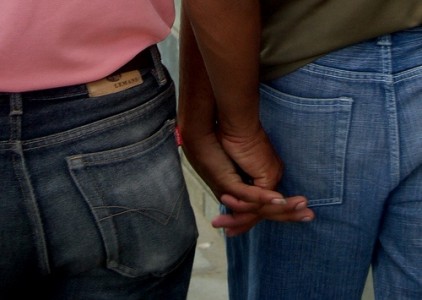
Nigerian President Goodluck Jonathan has assented to a bill outlawing gay relationships and same-sex marriage, effectively putting the legislation to use several months after it was passed by the two arms of the National Assembly.
With the president’s signature, anyone convicted for getting involved in gay relationship or entering into a same-sex marriage contract or civil union faces up to 14 years in jail.
It is also a crime to have a meeting of homosexuals, or to operate or attend a gay club, society or organization. Public show of same-sex intimate affection is also outlawed. Offenders may be jailed for up to 10 years.
“A person who registers, operates or participates in gay clubs, societies or organizations, or directly or indirectly makes public show of same-sex amorous relationship in Nigeria commits an offense and is liable on conviction to a term of 10 year,” a section of the bill signed by the president on an unspecified date, states.
For many Nigerians, accustomed to attacking Mr. Jonathan over his failure to address many of the nation’s ills and its stinking corruption, the bill’s signing, largely a popular decision, came as one of the commendable steps taken by his administration.
Across the social media and blogosphere, majority of Nigerians heaped praises on a president they are more used to criticizing and pointed out how he has defied international pressure over the bill, and acted in a way deemed to be in Nigeria’s interest.
“Jonathan got this one alone right. The Oyinbo(whites) can go to hell,” one Twitter post read.
News of the bill’s signing promptly spurred an outpouring of anti-gay sentiments across the social media, with many Nigerians discountenancing minority concerns about how beneficial criminalizing peoples’ way of life could be to a population struggling with insecurity, poverty and basic electricity.
“I applaud the president’s passage of the Gay Bill. Now Boko Haram, epileptic power supply and broken infrastructure will be resolved,” another Twitter post read.
For many, the decision affirmed Nigeria’s profoundly religious and cultural leaning, and symbolized a smack on the West widely seen here as notorious for expecting its values and beliefs adopted globally.
“More than 90 percent of Nigerians are opposed to same sex marriage. So, the law is in line with our cultural and religious belief as a people,” presidential spokesperson, Reuben Abati, was quoted by the AFP as saying.
“And I think that this law is made for a people and what (the) government has done is consistent with the preference of its environment.”
As well, the president’s approval triggered a scathing response from the international community, which had long encouraged the president to veto the submissions of the Senate and the House of Representatives on the Same-sex bill.
The United States Secretary of State, John Kerry, said Monday that the U.S was “deeply concerned” by a law that “dangerously restricts freedom of assembly, association, and expression for all Nigerians.”
T
he United States’ Permanent Representative to the United Nations and member of President Obama’s cabinet, Samantha Power, also deplored the bill’s final approval.
In a Twitter post, Ambassador Powers said her country was “deeply troubled that Nigeria’s President signed anti-LGBT law,” and described the law as a “Big setback for human rights for Nigerians.”
The International Humanist and Ethical Union, an umbrella organization for humanist, atheists and secularists, called the legislation a “heinous law” and “an attempt to silence critics.”
“In the context of Nigeria this is a populist move, perhaps designed to win votes ahead of next year’s election. But the president should know it comes with a cost: it destroys any pretence Goodluck may once have had to reputable international statesmanship,” the group’s president, Sonja Eggerickx, said.
Ahead of its being signed into law, Amnesty International had urged President Jonathan to reject the bill, calling it “discriminatory”.
The anti-gay bill was passed by the Nigerian Senate in December 2011, while the House of Representatives followed suit in May 2013, defying a threat from Britain to withhold aid from nations violating gay rights.
Nigeria now joins 34 other African nations with strict anti-gay laws. Of the 78 countries where homosexuality is criminalized, 35 are in Africa.
If Britain makes good its threat to cut aid following the signing of the bill, Nigeria will lose just about 1 billion pounds (N250 billion) in aid- less than the annual budget of a Niger Delta state.

No comments:
Post a Comment